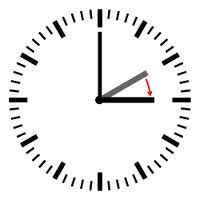 It’s that time again. I know it feels as if we just turned our clocks back by one hour, how could we possibly be springing ahead so soon? Well, that sense of Daylight Savings Time (DST) sneaking up on you a lot earlier than you remember growing up is not just due to the flight of time as we age. The current time frame that the US employs for DST went into effect only 5 years ago, in 2007, giving us one full month more of increased sunlit hours in the evenings than we used to have. We all need to transition from Standard Time (ST) to Daylight Savings Time (DST) earlier in the year than we used to, and transition back later than we used to. Since 2007, we are expected to move our clocks one hour ahead starting the second Sunday of every March—which happens to be this Sunday, March 11, 2012. We used to start DST the first Sunday of every April, and switch back to ST the last Sunday of every October. Now we switch back the first Sunday of every November.
It’s that time again. I know it feels as if we just turned our clocks back by one hour, how could we possibly be springing ahead so soon? Well, that sense of Daylight Savings Time (DST) sneaking up on you a lot earlier than you remember growing up is not just due to the flight of time as we age. The current time frame that the US employs for DST went into effect only 5 years ago, in 2007, giving us one full month more of increased sunlit hours in the evenings than we used to have. We all need to transition from Standard Time (ST) to Daylight Savings Time (DST) earlier in the year than we used to, and transition back later than we used to. Since 2007, we are expected to move our clocks one hour ahead starting the second Sunday of every March—which happens to be this Sunday, March 11, 2012. We used to start DST the first Sunday of every April, and switch back to ST the last Sunday of every October. Now we switch back the first Sunday of every November.
For some, even these small changes could adversely affect sleep—particularly since they now happen seemingly in such quick succession. So, it may be wise to not only set your clock, but also to make a concerted effort to reset your sleeping habits as well, so as to minimize the risk to the quality of your rest.
Some tips to manage your sleep habits at this time of year include:
- The weekend of the time change, go to bed half an hour earlier than usual on Friday night and an hour earlier on Saturday night. Then get up a half hour earlier than usual on Saturday morning and an hour earlier on Sunday to spread out your body’s adjustment period over two days instead of having it all hit on Sunday morning.
- Plan Saturday’s activities, including meals, an hour earlier than normal to train your body for the change on Sunday.
- Set the clocks ahead one hour at 6 pm on Saturday afternoon instead of at bedtime to start the adjustment early.
- Avoid spending more time in bed than needed.
- Set your alarm to wake up at the same time you normally would on Sunday. Whatever you do, don’t sleep in on Sunday morning. Sleeping late just prolongs your body’s adjustment period into Monday, when you have to go back to work.
- If the weather allows, go for a walk or plan some other outdoor activity on Sunday morning. Getting sunlight helps your body adjust and promotes a better night’s sleep Sunday night.
- Avoid the temptation to take a nap on Sunday. Like sleeping in, a nap prolongs the adjustment period and makes it harder to go to sleep on time Sunday night.
- If you have any problems with your heart, get plenty of sleep and limit your stress the week after daylight saving time. A 2008 New England Journal of Medicine study noted a 5 percent increased risk of heart attack during the first three days after the time change.
- On Monday, eat a high-protein diet and limit your caffeine so you can get to sleep on time.

